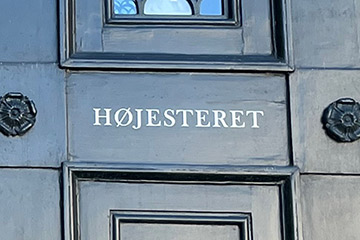The Danish Ministry of Taxation rejects criticism of tax rules on investment funds
10 November 2015
The Danish tax rules on investment funds have been heavily criticised for preventing foreign funds' access to the Danish market and deterring non-Danish investors from investing in Danish investment funds. A new analysis from the Ministry of Taxation rejects the criticism.
The Danish tax rules on investment funds have been heavily criticised for creating a tax barrier that prevents foreign funds' access to the Danish market (the import problem) and deters non-Danish investors from investing in Danish investment funds (the export problem). Thus, nearly 4 years ago the Ministry of Taxation initiated a comprehensive analysis of the taxation of investment funds. Among other things, the analysis considers the possibilities of an implementation of identical rules for both Danish and foreign investment funds. This analysis prepared by government officials from the Ministry of Taxation has just been published and below we will summarise some main findings and conclusions.
If the requirements are not fulfilled, the mutual fund will instead, in the majority of cases, be classified as a so-called investment company and Danish investors investing in the fund will in general be taxed based on a mark-to-market principle (in Danish "lagerprincippet"), meaning on an unrealised basis. Further, in relation to Danish individual investors, gains and losses will be treated as capital income, whether the fund primarily invests in shares or not.
Thus, there are some essential advantages of obtaining the status as an investment fund with minimum taxation.
In recent years a number of foreign investment funds have criticised that the requirements for obtaining the status as an investment fund with minimum taxation are so complicated and administratively burdensome that they hinder foreign funds' access to the Danish market.
Even though the Ministry of Taxation acknowledges the administrative burdens caused by the requirements for obtaining the status as an investment fund with minimum taxation in its analysis, it is the Ministry's assessment that the current rules do not constitute a barrier for foreign investment funds. It is also pointed out - as a further justification for the conclusion - that certain foreign asset managements have in fact established investment funds with min-imum taxation in Denmark.
In addition, it is pointed out that dividend payments to foreign investors from Danish in-vestment funds with minimum taxation will often include profits earned as capital gains on shares. Thus, income that in case of a direct investment would have been tax-exempt for foreign investors is included in the taxable dividend payments.
On such grounds, the Ministry of Taxation has assessed if there is a basis for relaxing the Danish dividend tax. However, the conclusion is that there is no basis for such relaxation as a relaxation will entail a departure from the fundamental Danish principle of taxing outbound dividend payments. Furthermore, according to the Ministry of Taxation the Danish dividend tax rules are not materially preventing Danish investment funds from selling their products to foreign investors.
However, based on a more detailed review of the analysis it is clear that the Ministry recognises that there are challenges in relation to both import and export of investment products, but the Ministry of Taxation does not find these challenges to be material enough to justify the negative government revenue impact of the possible solutions that the Ministry has analysed.
On this basis, the Ministry's analysis will likely kick-start a well-informed political debate, and there seems to be no reason to expect that the analysis will silence the critics.
The import problem
If a mutual fund fulfils a number of requirements, it can obtain Danish status as a so-called "investment fund with minimum taxation". This means that essentially Danish investors are taxed as if the investment was carried out directly in the underlying assets. Investments in funds primarily investing in bonds are taxed as so-called capital income, and investments in funds primarily investing in shares are treated as share income (which typically attracts a lower net tax burden than capital income). The tax is levied in the same steps as if the assets had been owned directly.If the requirements are not fulfilled, the mutual fund will instead, in the majority of cases, be classified as a so-called investment company and Danish investors investing in the fund will in general be taxed based on a mark-to-market principle (in Danish "lagerprincippet"), meaning on an unrealised basis. Further, in relation to Danish individual investors, gains and losses will be treated as capital income, whether the fund primarily invests in shares or not.
Thus, there are some essential advantages of obtaining the status as an investment fund with minimum taxation.
In recent years a number of foreign investment funds have criticised that the requirements for obtaining the status as an investment fund with minimum taxation are so complicated and administratively burdensome that they hinder foreign funds' access to the Danish market.
Even though the Ministry of Taxation acknowledges the administrative burdens caused by the requirements for obtaining the status as an investment fund with minimum taxation in its analysis, it is the Ministry's assessment that the current rules do not constitute a barrier for foreign investment funds. It is also pointed out - as a further justification for the conclusion - that certain foreign asset managements have in fact established investment funds with min-imum taxation in Denmark.
The export problem
Another point of criticism, which the Ministry of Taxation has analysed, is that it is not favourable for foreign investors to invest in Danish funds. The criticism is especially caused by the fact that Danish investment funds (as opposed to funds in Luxembourg for instance) have to withhold Danish dividend tax when paying out dividends to foreign investors.In addition, it is pointed out that dividend payments to foreign investors from Danish in-vestment funds with minimum taxation will often include profits earned as capital gains on shares. Thus, income that in case of a direct investment would have been tax-exempt for foreign investors is included in the taxable dividend payments.
On such grounds, the Ministry of Taxation has assessed if there is a basis for relaxing the Danish dividend tax. However, the conclusion is that there is no basis for such relaxation as a relaxation will entail a departure from the fundamental Danish principle of taxing outbound dividend payments. Furthermore, according to the Ministry of Taxation the Danish dividend tax rules are not materially preventing Danish investment funds from selling their products to foreign investors.
Future perspective
As described and as stated by the Danish Minister of Taxation in the media, the overall con-clusion of the analysis is that the Danish rules on taxation of investment funds work as in-tended. Thus, there is no need for any material amendments to the rules.However, based on a more detailed review of the analysis it is clear that the Ministry recognises that there are challenges in relation to both import and export of investment products, but the Ministry of Taxation does not find these challenges to be material enough to justify the negative government revenue impact of the possible solutions that the Ministry has analysed.
On this basis, the Ministry's analysis will likely kick-start a well-informed political debate, and there seems to be no reason to expect that the analysis will silence the critics.







